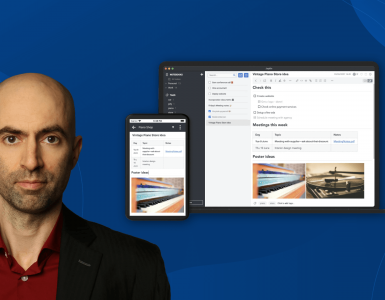Discourse is a well-known discussion platform. Founded in 2013, its focus is to offer a highly-customisable platform for civilized discussion. The popular open-source project is used by more than 30.000 online communities of all sizes.
We are happy to speak to Hawk (as she prefers to be addressed), the Co-CEO from Discourse about how it all started, how online forums developed over the years and what lies ahead.
Hi Hawk, thanks for taking your time to talk to us. First can you tell us a little bit about the story behind Discourse. Who is behind the project and what was the main motivation to start it?
No problem! It all began in 2013, with a dream and a small team of talented software engineers who were committed to making the internet a better place. Our principal founder – Jeff Atwood (aka codinghorror) of Stack Overflow fame – noticed how rapidly the online forum space was stagnating and made a plan to disrupt it. He attracted the attention of Robin Ward and Sam Saffron, and together they formed Civilized Discourse Construction Kit, Inc. with the goal of encouraging healthy online discourse.
I joined the mission 4 years later as a subject matter expert (having spent the last decade working as a consultant in the online community management space) and was tasked with building out the operational side of the business. There are now more than 80 of us and we’re growing fast.
Since the start of Discourse, there have been big changes to the online world. The speed, the devices we use, the amount of pages, the amount of users. What have been the biggest changes for online forums?
There sure have! There was a fundamental shift in online social behaviour and adoption around the time of our inception, due to the rapidly growing popularity of social media. People were suddenly accustomed to interacting and seeking answers online and forum software wasn’t keeping up. The popular platforms of the time (think legacy vBulletin and phpBB) had become cumbersome and hard to upgrade, so people were looking for more modern alternatives. Around the same time, Online Community Management as a formal practice was emerging which meant that platforms needed to be reimagined in a way that allowed less- (or non-) technical practitioners to administer them without engineering support.
A more recent change to the community ecosystem was the emergence of fast-lane discussion mediums like Slack and Discord. While they offer a very different experience, their popularity is hard to ignore. As such, we recently released Discourse v3.0 which ships with built in chat. Community Managers no longer need to integrate with a third party platform, allowing them to moderate both fast- and slow-lane discussions in one place.
Discourse has established itself in a tough market, what would you say sets your platform software apart from the competition and what is the main benefit for the user?
There are a few things that spring to mind – the first of which is that Discourse is 100% open source – one of the very few OS platforms in the community space. Our extremely active OS project brings the usual benefits of high quality code and security through transparency. It also offers a level of product flexibility that our competitors can’t match.
Given our globally distributed, remote nature, at Discourse we use our own product extensively – in fact we use it almost exclusively to carry out our work. This degree of dog-fooding ensures that the product is rigorously beta tested before we release to the community.
We have an incredibly fast moving roadmap, with new version bumps released every few weeks. Our customers don’t have to wait months or years for new features, which is reasonably common amongst our competitors. We build new functionality on demand for our hosted Enterprise customers and release them as plugins, creating a flexible ecosystem that allows customers to build a community that is truly appropriate for their audience.
One of the most important aspects of Discourse is that customers own their data. We allow anyone to download a full backup of their community at any time, at no cost. Many of our competitors charge for this (or offer one free download only, when a minimum of two are required to migrate to another platform).
From a features perspective, Discourse excels when it comes to moderation (our Trust Levels and flagging system empower the community to self-moderate and build the kind of culture they want to be a part of – freeing up community professionals to be more strategic), flexibility (our architecture of plugins and themes allows community managers to customise to suit their audience), analytics (our Data Explorer plugin gives community managers full read-only access to query their entire database) and support (our distributed nature means that we offer round the clock support of a quality that we are famous for and extremely proud of).
Perhaps the most powerful feature from an administration point of view is the customisability. Community Managers have the ability to edit any content on site without technical knowledge.
You offer different packages for a hosted version of Discourse or it can be self-hosted. What are the advantages and disadvantages of both options and what server requirements are needed to self-host Discourse?
Correct! Our hosted packages start as low as $50/mo and scale up to large Enterprise arrangements. There are several benefits to hosting with us:
- Technical Infrastructure : We have a robust hosting infrastructure that can resist failures, where hosting on a VPS is subject to the provider’s availability.
- Management : We handle all of the technical details of Discourse, from setting up email to handling all of the server work. If you self-host and something goes wrong, you need to be comfortable getting your hands dirty in servers or would need to hire someone to handle it for you. We don’t offer private support for self-hosting.
- Security : We manage timely security patches. In some cases we update our hosted sites prior to publicising a security fix to the general public.
- Support : Hosting with us means you have the support of the team who knows the software best. We have excellent response times for requests, too. Self-hosters are limited to support on our community at meta.discourse.org.
The advantages of self-hosting are cost (assuming you have the technical resource to handle it in house), data privacy (as a host we have access to the data of customers that we host in order to support them) or full control if you want to fork the software. More information about self-hosting requirements is available at discourse/INSTALL-cloud.md at main · discourse/discourse · GitHub
For self-hosting Discourse, our VPS plans offer all you need to meet your requirements.
As for most (if not all) open source projects, the community is an important factor. How active is the Discourse community and what role does it play?
Our community at meta.discourse.org is extremely active with 5k+ new posts per month and is a fantastic resource for self-hosted users and project development. Our community is fundamental in defining our roadmap and gathering real feedback from users and self-hosters.
We also host a marketplace for sourcing freelancers to build plugins or themes, and we know of several successful businesses that survive solely off our wider Discourse ecosystem.
Before we let you go, one more question for you as someone with lots of experience in running a project like this. What advice would you give someone wanting to create their own open-source app?
A big portion of our shared digital infrastructure today runs on open source software and starting your own open source project can be a very rewarding experience. Showing your work in public and having people around the world use it, comment on it, inspect it and improve it can be incredibly satisfying. It can also be intimidating, especially at first; the scrutiny and criticism of the general public can be quite harsh. But in the long run, input from others will make your project better.
The key is to nurture good relationships with contributors and have like-minded people join you as co-owners of your project. They will lighten the burden of maintaining it and you will get to share the joys of open source with them.







Add comment